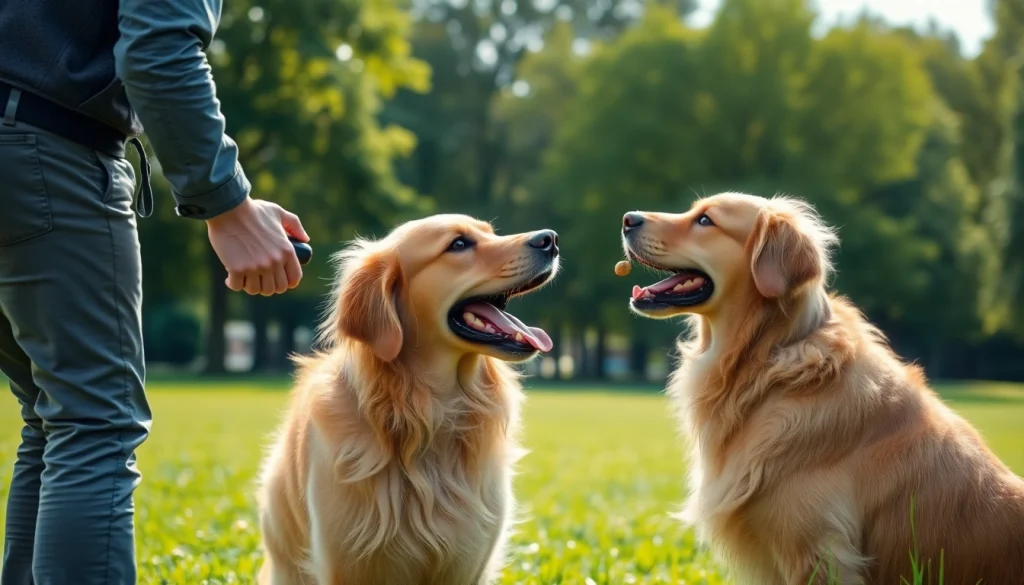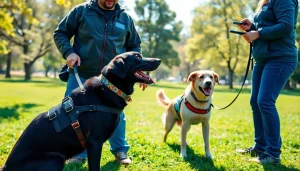
Understanding the Basics of Dog Training in Irvine
In Irvine, California, a city well-known for its beautiful parks and family-friendly atmosphere, dog training is essential for pet owners looking to cultivate a harmonious relationship with their furry companions. Proper Dog Training Irvine ensures that your beloved pet not only obeys commands but also behaves appropriately in various social situations. Understanding the fundamentals of dog training will significantly enhance your experience with your canine friend.
Why Training is Essential for Dogs
Training is paramount for multiple reasons. First and foremost, it establishes communication between you and your dog, fostering an understanding that transcends words. Second, well-trained dogs are happier and healthier, as training reduces anxiety and enhances their overall behavioral repertoire. A structured training regimen can also help mitigate dangerous behaviors, such as aggression or destructiveness, promoting a safe environment for both the dog and its owner.
Moreover, dog training is crucial for socialization. Dogs that interact safely with others—be it humans or animals—tend to be more balanced and confident. This confidence leads to less stress and anxiety, making walks, visits to the vet, or encounters with strangers much more manageable.
Different Training Methods Explained
Training methods can vary quite significantly, but the most commonly regarded techniques include positive reinforcement, operant conditioning, and clicker training. Positive reinforcement focuses on rewarding desired behaviors through treats, praise, and play. This approach has demonstrated long-term effectiveness as it fosters a sense of enjoyment in learning for dogs.
Operant conditioning, which underlies much of dog training, incorporates both positive and negative reinforcement to encourage or discourage specific behaviors. For instance, while rewarding good behavior fosters its recurrence, implementing consequences for bad behavior can deter unwanted actions. Clicker training, a subset of positive reinforcement, utilizes a distinct sound that marks the desired behavior, facilitating clarity in communication.
Choosing the Right Trainer in Irvine
Finding a qualified trainer is vital to the success of your dog’s training. Considerations should include the trainer’s credentials, methods used, and reviews from past clients. In Irvine, there are various trainers specializing in diverse training methodologies. Look for someone who aligns with your values and is experienced in the specific areas where you need assistance, such as obedience training, behavioral issues, or puppy socialization.
Moreover, schedule a consultation to observe a training session beforehand. This approach allows you to ascertain whether the trainer’s style resonates well with your dog, ensuring a comfortable and productive environment for learning.
Popular Dog Training Classes Available in Irvine
Irvine boasts an array of dog training classes tailored to various needs, whether you’re seeking group classes, private sessions, or specialized puppy training outings.
Group Classes: Benefits and Considerations
Group classes can be an excellent choice for both dog and owner, offering a social environment where dogs learn to interact with other animals and people. These classes, typically focusing on basic obedience, provide a structured setting that encourages learning through socialization.
However, it’s crucial to assess if group training is right for your dog. While these classes often foster social skills, dogs that experience anxiety or aggression in crowded settings may require more individualized attention in a private setting. Thus, always consider your dog’s unique temperament and socialization level before enrolling.
Private Training Sessions in Irvine
For pups that require specialized attention or exhibit behavioral challenges, private training sessions can be particularly beneficial. One-on-one training allows for tailored guidance, focusing directly on your dog’s unique needs and learning pace. In Irvine, many trainers offer private sessions to address concerns like aggression, fearfulness, or separation anxiety.
Private training can also delve deeper into skill sets, teaching advanced commands or tricks that enrich your dog’s daily experience. A major advantage of private sessions is the flexibility in scheduling, allowing training to occur at your convenience.
Puppy Training Programs: Starting Early
Starting training early can significantly impact a puppy’s development and overall behavior. Puppy training programs in Irvine typically focus on socialization, basic obedience, and essential commands. These early formative stages will set the foundation for a well-adjusted adult dog.
Effective puppy training also includes exposure to various environments, people, and other animals, fostering confidence and reducing the likelihood of fear-related behaviors as they mature. Classes may combine elements of play, obedience, and social interaction, creating a balanced learning environment conducive to growth.
Common Challenges in Dog Training and How to Overcome Them
Training a dog is not without its challenges. Understanding common issues can help you approach training with a strategic mindset.
Addressing Behavioral Issues in Training
Behavioral problems can arise due to a myriad of factors, including lack of socialization, fear, or unresolved anxiety. To address these issues, it is essential to pinpoint the triggers behind the behavior. For instance, a dog that barks excessively may be doing so out of excitement or fear.
Employing desensitization techniques, where the dog is gradually exposed to triggers in a controlled manner, can be beneficial. Reinforcing positive responses with treats and praise can effectively redirect their focus and diminish unwanted behaviors over time.
Managing Your Dog’s Aggression Effectively
Aggression in dogs can manifest for various reasons, including fear, territorial instinct, or frustration. Addressing aggression requires careful handling and understanding. It’s advisable to consult a certified professional trainer when dealing with aggressive behaviors.
Begin by observing your dog’s body language and vocalizations. Recognizing early warning signs can help prevent escalation. Training should focus on redirecting aggressive responses through positive reinforcement and gradually introducing desensitization techniques, ensuring your dog feels safe while reducing their aggressive tendencies.
Socialization and Its Importance in Training
Socialization is crucial at every stage of a dog’s life, but especially during their formative months. Through socialization, dogs learn to comfortably interact with humans, other animals, and varying environments, reducing anxiety and fearlessness.
Incorporating socialization into your training regimen involves exposing your dog to new experiences regularly, providing opportunities for positive interactions. Dog parks, training classes, and even casual walks can serve as excellent venues for socialization. Always ensure that introductions are controlled and positive to promote confidence.
Advanced Training Techniques to Enhance Your Dog’s Skills
Once you’ve established a solid foundation of obedience, exploring advanced training techniques can deepen the bond with your dog and expand their skill set.
Clicker Training: A Positive Reinforcement Tool
Clicker training is a popular method based on operant conditioning and positive reinforcement. It involves the use of a small handheld clicker to mark desired behaviors instantly, followed by a reward. This technique enhances clarity and consistency, as the click sound conveys to the dog precisely what they did right.
To start clicker training, introduce the sound of the clicker without the reward to help your dog associate it positively. Once they understand that the click leads to treats, you can begin to introduce commands or tricks. This technique not only aids in command training but increases your dog’s engagement and excitement during the process.
Agility Training: Fun Ways to Bond with Your Dog
Agility training provides both a mental and physical challenge for your dog while enhancing your bond with them. This activity involves navigating through various obstacles such as tunnels, jumps, and weave poles, offering a fun and engaging way to practice commands and improve cooperation.
Many facilities in Irvine offer agility classes for all skill levels. The benefits of agility training extend beyond physical health; it also improves focus, build confidence, and encourages teamwork between you and your dog. The joy and excitement derived from successfully completing an agility course are mutually rewarding!
Service Dog Training: A Guide for Beginners
For those interested in training a service dog, it opens a realm of possibilities. Service dogs assist individuals with disabilities, providing necessary support that can enhance the quality of life significantly. Training a service dog requires great patience and commitment, as they must master a repertoire of tasks tailored to their owner’s needs.
The first step involves selecting a breed known for its service capabilities, followed by socialization and establishing basic obedience. Specific training might include tasks like retrieving items, guiding visually impaired owners, or alerting to medical conditions. Working closely with a certified professional trainer can greatly enhance the success rates and effectiveness of your service dog’s training.
Measuring the Success of Your Dog Training Journey
Assessing the effectiveness of your training methods is crucial, whether you’re a beginner or a seasoned dog owner. Learning to recognize the signs of progress in your dog’s behaviors will allow you to adjust training as necessary.
Setting Realistic Training Goals
Establishing attainable goals is vital to maintaining motivation for both you and your dog. Set clear, measurable, and manageable goals that build on one another. For instance, beginning with a simple command like “sit” before moving onto more complex commands like “stay” or “come” ensures a solid foundation for further training.
Documenting progress through a training journal can serve as a reminder of milestones reached and areas for improvement, making it easier to ascertain where continued focus is needed.
Tracking Progress: Tips and Tools
Monitoring your dog’s progress can be simplified through various tools. For example, consider using smartphone applications designed for tracking pet training. These apps offer customizable goal-setting options and reminders, enabling you to stay organized and consistent.
In addition to apps, consider video recording training sessions. Reviewing footage enables you to evaluate your training techniques and recognize patterns in your dog’s behavior. This self-assessment can lead to a more effective training approach.
When to Seek Professional Help in Irvine
While many training challenges can be addressed with self-teaching and patience, knowing when to seek professional help is important. Signs that professional assistance may be necessary include persistent behavioral problems, aggression issues, or your feeling overwhelmed by the training process.
Professional trainers possess expertise and experience that can shine through in difficult situations where progress seems stagnant. They can offer individualized strategies tailored to your specific needs, ensuring a path moving forward. In Irvine, trainers often provide consultations to help assess your situation and develop a suitable training plan.





